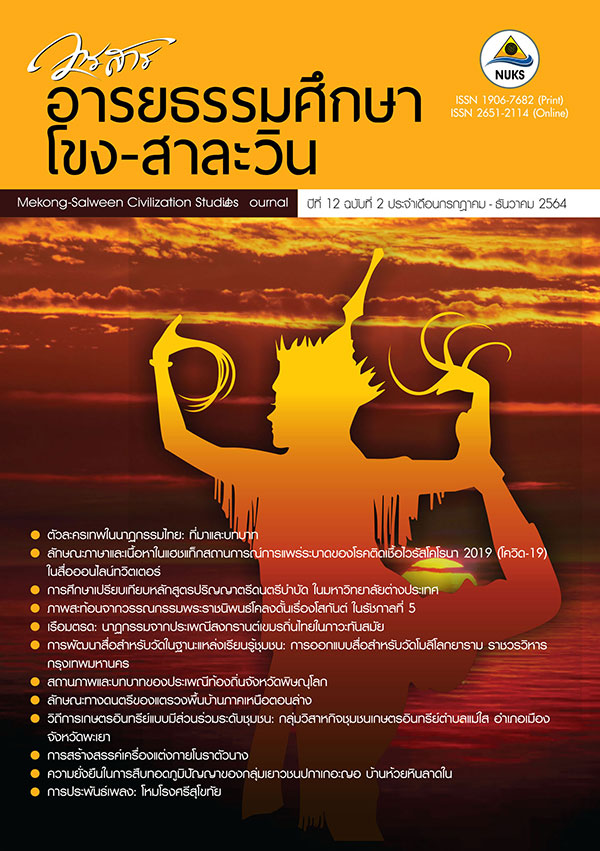The Status and Role of Local Traditions in Phitsanulok สถานภาพและบทบาทของประเพณีท้องถิ่นจังหวัดพิษณุโลก
Main Article Content
Abstract
This article aimed to study the status and role of local traditions in Phitsanulok to provide an overview of local traditions. The data were collected from written documents, books, and research reports. This was a descriptive and analytical study based on the concept of tradition and Bascom’s (1954) framework of folklore. The results showed that local traditions in Phitsanulok can be classified into 6 types: 1) traditions about history, 2) traditions about rain, 3) tradition about rice farming, 4) tradition about Buddhism, 5) tradition about life, and 6) modish tradition. The role of local traditions in Phitsanulok revealed 4 aspects according to Bascom's (1954) framework: 1) providing enjoyment and fun to people in society, 2) affirming the importance of rituals and enriching the culture, 3) recognizing education as part of the process of social refinement and refinement, and 4) maintaining social norms. Moreover, it was also found 2 additional aspects: 1) regarding social and cultural aspects which included local traditions helped creating unity among the villagers in the community. They were also a dependable source of calmness and the heart of the villagers in the community. Furthermore, local traditions passed on Buddhism from generation to generation and created local arts and 2) regarding economy, local traditions helped to generate income for local villagers. These local traditions raised cultural capital. In addition, this study can continue expanding the body of knowledge in cultural studies and traditions with tourism in the future.
Downloads
Article Details
References
Bascom, W. R. (1954). Four functions of folklore. The Journal of American Folklore, 67(266), 333-349.
Boonyarak, S. (1979). Traditions and Beliefs of Nakorn Thai People. In The report of the 2nd Phitsanulok History Seminar. Phitsanulok: Pibulsongkram Teachers College.
Department of Cultural Promotion, Ministry of Culture. (2019). The festival, Performing Arts, Tradition in Thailand. Bangkok: Department of Cultural Promotion, Ministry of Culture.
Distapan, W. (2014). Phra Upakhut: Transmission and Reproduction of Belief, Myth and Ritual in Contemporary Thai Society (Master’s Thesis). Chulalongkorn University, Bangkok.
Jaruworn, P. (2013). Malai Sattha: The dynamics of chanting Phra Malai from different research fields. Bangkok: Faculty of Arts, Chulalongkorn University.
Muksong, C. (2000). Phitsanulok. Bangkok: Ton-or.
Na Thalang, S. (2016). Creative Folklore: Synthesis and Theory. Bangkok: Center for Anthropology Sirindhorn.
Nimmanahaeminda, P. (2004). Mong Phasa. Bangkok: Maekhamphang.
Nimmanahaeminda, P. (2017). The Twelve-Month Tradition: The Way of Life in the Year of the Tai People. In Thai folklore in rice culture (pp. 95-157). Bangkok: Institute of Thai Studies Chulalongkorn University.
Phakdeephasook, S. (2018). The Relationship between language and identity and guidelines for the study of Thai language. Bangkok: Faculty of Arts, Chulalongkorn University.
Sathiankoset. (1972). The Life of Thai people in the past and the study of Thai traditions. Phra Nakhon: Klang Witthaya.
Stapanawatana, J., Sirasoonthorn, P. and Suwanpratest, O. (2011). Phitsanulok: Province and Challenge Opportunities. Phitsanulok: Naresuan University.
Sujachaya, S. (2005). The Rituals, legends, tales, songs: the function of folklore and Thai society. Bangkok: Faculty of Arts, Chulalongkorn University.
The Local Wisdom of Phitsanulok. (2003). Phitsanulok: Social Development Program, Faculty of Social Sciences, Naresuan University.
The Royal Institute. (2013). Dictionary of the Royal Institute of 2011. (2nd edition). Bangkok: The Royal Institute.
Valipodom, S. and Prasongbandit, S. (2003). Twelve Month Traditions: Changing Rituals. Bangkok: Sirindhorn Anthropology Center.


